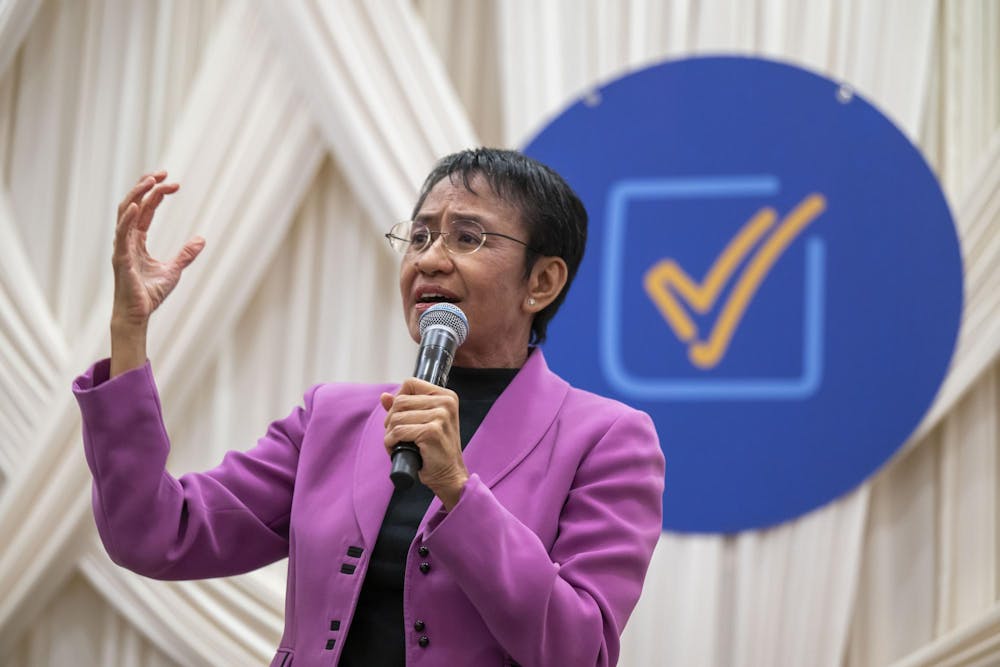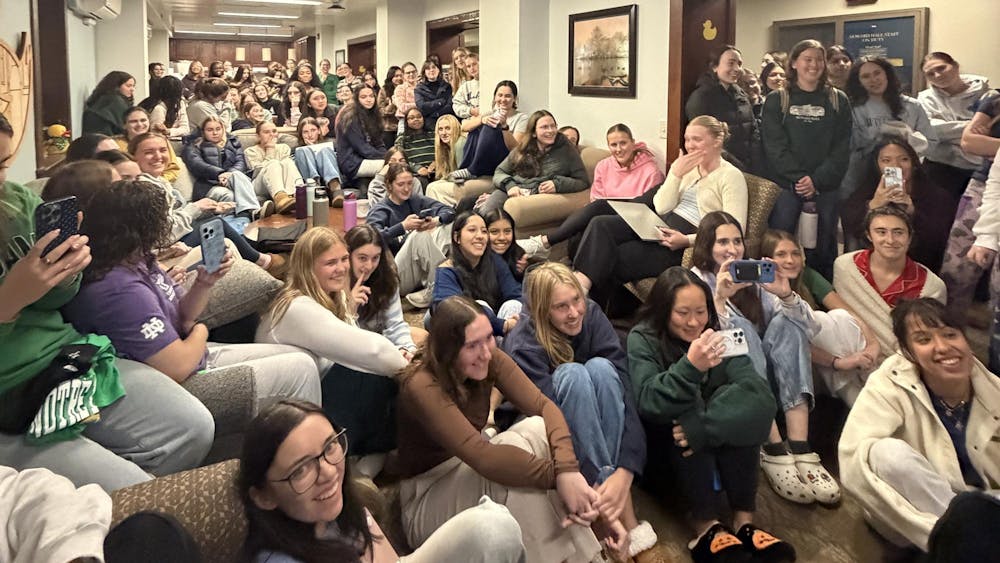“They called me scrotum face,” Nobel Peace Prize laureate and Filipina journalist Maria Ressa said.
On full display on the Morris Inn’s Smith Ballroom projector was a picture of Ressa’s face photoshopped onto a ballsack, along with other crude memes making fun of her skin condition or depicting her as a Neanderthal. At one point in her career, Ressa received 90+ hate messages like this every hour.
Ressa has worked nearly two decades as a reporter on Southeast Asian issues for CNN, covering everything from natural disasters to war. She founded Filipino online news organization Rappler to combat disinformation and challenge authoritarianism. But in doing so, she has made herself a target for online harassment and political and judicial persecution from the former government of Filipino President Rodrigo Duterte.
Considering her circumstances, one would expect Ressa to be a cynic, University President Fr. Jenkins said when introducing her to the audience.
“But when I met Maria, I found not a cynic, but a person infused with compassion, joy and hope,” he said. “The most pernicious effect of dictators is that they can steal not just our freedom, but our joy. Maria has not succumbed.”
“[She] is a great inspiration to us,” event moderator and associate economics professor Andrés Mejía Acosta said. “The pioneering and courageous work [she does] directly aligns with our school’s commitment to advancing integral human development.”
Ressa was invited to speak Wednesday at the fifth and final event of the 2023-2024 Notre Dame Forum on “The Future of Democracy,” but she is no stranger to the University. She was recently appointed as a distinguished policy fellow at the Keough School of Global Affairs and spoke at last year’s Asia Leadership Forum.
The 2023-2024 Notre Dame Forum on “The Future of Democracy” is intended to create campus-wide conversations about threats to global democracy and how to combat them. Past keynote speakers include Justice Elena Kagan, senators Chris Coons and Todd Young, Steven Levitsky and Robert Putnam.
Ressa spoke on challenges democracy faces today — particularly in regard to the dissemination of accurate news and information in a digital age.

With her years of experience in the industry, she emphasized the changing role of journalism. Previously, journalists were the gatekeepers of information and had to live up to certain ethical standards before releasing information into the public sphere. In today’s digital age, however, the power of information distribution is in the hands of large tech conglomerates and person-to-person organizations — and these aren’t necessarily regulated.
Further, tech conglomerates and authoritarian governments have an incentive to make citizens distrust the news, according to Ressa. She said she has seen these disinformation campaigns in the Philippines under President Duterte, in Russia under President Vladimir Putin and in the United States under President Donald Trump.
“The goal isn’t to make you believe one [fake] thing,” she said. “It’s to make you distrust everything, and when you do, civil society dies.”
In particular, she pointed to attacks against female journalists — such as ”scrotum face” — as a fear tactic. Ressa cited a UNESCO survey that found 73% of female journalist respondents experienced online abuse. Nearly a quarter of them received threats of physical violence.
Additionally, the personalized design of online technological information dissemination — much of which is determined by AI algorithms created by Meta and TikTok — atomizes us, Ressa said. Plus, it’s addictive.
“We tear apart the public sphere to create our own realities,” she said. “Social media turns us into inmates in our own insane asylums.”
Ressa argued people need more agency in how they consume information. She stressed the failure of technological policy in the United States. The speed at which large language learning models and AI are developing is rapidly outpacing legislation.
“Rule of law has been thrown out. There are no laws in the virtual world, and that has changed our physical world,” she said. “Good God! We need to move faster.”
But Ressa said she was confident the University will hold a special place in shaping future technological policy.
“You are unique because you have values. You live the faith,” she said. “Draw the line between right and wrong. Then, hold the line. You don’t really know who you are until you’re forced to fight and defend it.”










